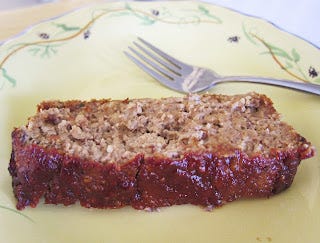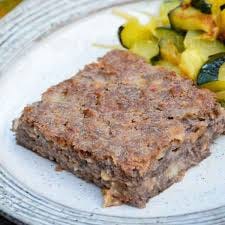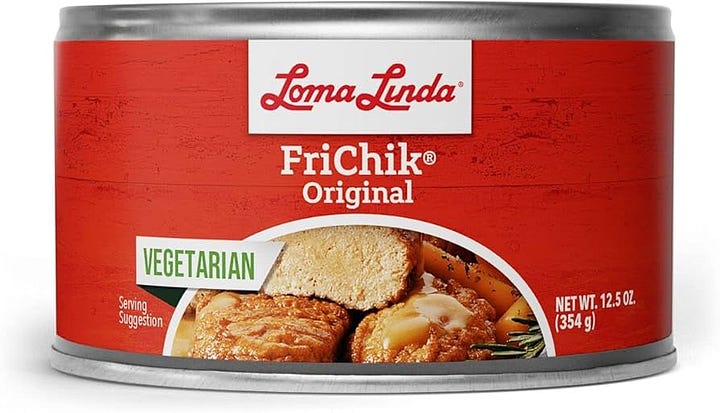For many years I’ve joked about eating foods that made me feel self-righteous and morally superior, but I believe this joke is actually a subconscious jab at my upbringing. I grew up in the Seventh-Day Adventist (SDA) religion, which touts vegetarianism as part of a healthy lifestyle. While early founders of the religion weren’t necessarily 100% vegetarian, they believed the Old Testament promoted vegetarianism in the Garden of Eden as part of honoring the body given to humanity by God, and after the Great Flood, eating only certain animals was permitted.1
Going to Adventist schools and church potlucks meant that the food would be vegetarian. For many years, that meant reliance on casseroles that used a combination of cereal or another grain, vegetable, cheese, and egg. Sometimes a can of creamed soup provided the sauce, but only if the soup didn’t include any meat-based broth or other ingredients2. A few months ago I got Momcat’s old recipe box, and it contains multiple index cards with different recipes for casseroles, patties, or loaves. Most vegetarian casseroles disgusted me. They never looked appealing or tasted very good—though much of that was due to the tradition of avoiding most spices and flavorings.3


The vegetarian lifestyle encouraged the beginning of many different businesses that made processed meat substitutes, and the first canned meat substitute was made by John Harvey Kellogg in 1896.4 Companies dedicated to meat substitute production came along, including Worthington Foods and Loma Linda Foods. You could buy these vege-meats—the collective term used by many SDAs, though some called them meat analog—at Adventist shops around the country. There were frozen options as well: breakfast proteins like Stripples (vege-bacon) and sausage patties or links, or lunch vege-meat like smoked turkey (my childhood favorite), corned beef, chicken, and Wham (fake ham, of course). Sometimes you’d find vege-meat in a local grocery store, but usually it was only a few cans of Fri-Chik or Choplets on the bottom of a dusty shelf, often with a small selection of kosher foods reserved for Jewish holidays.


Back in the ‘70s and ‘80s, getting any sort of positive reaction to vegetarianism was difficult. It was radical, maybe considered communist by some, in a country built on meat, corn, and potatoes. If my Adventist high school held a banquet at a non-Adventist facility, the food was either really bad or unbalanced because the concept of a meatless buffet or banquet was anathema to event coordinators. There would be a tray of vegetable lasagna next to a side of scalloped potatoes.
Things changed for vegetarians when the term “plant-based” became more popular.5 This semantic shift was the PR that vegetarians needed all along, because now instead of focusing on the lack of meat, the focus was on fruits, vegetables, nuts, and legumes. The use of “plant-based diet” goes back to 1980, when a researcher presented his findings on diet modification to NIH. Dr. T. Colin Campbell got a grant from NIH to study the effects of diet on the body and focused his attention on China, where he could study a high population of people whose diet is pretty consistent throughout their lives. Dr. Campbell said of the term “plant-based”:
“I wanted to emphasize that my work and ideas were coming totally from science and not any sort of ethical or philosophical consideration,” he said.
But science be damned, because who doesn’t want that sense of moral superiority and self-righteousness that comes from eating more plants? Don’t we all want to be doing things that make us feel better about ourselves? And, whether we want to admit it or not, don’t we sometimes want to feel like we’re better than other people?
In my baby book, Momcat noted a lot of the things I said as a toddler and preschooler. One of my bedtime prayers included “bless all the vegetarians.” Now I wonder if the vegetarians—and the vegans and those dabblers in plant-based eating—still need blessings, since it’s all more mainstream. My vegetarian cousins Eric and Lance definitely didn’t need blessings back in the late ‘80s when they yelled “DEAD MEAT! DEAD MEAT!” at Thanksgiving as our grandmother brought out the 15-pound turkey she’d spent hours preparing and they only got a light scolding. I probably needed to be blessed whenever I sneakily ate shellfish or pepperoni pizza in college, when I was living at home with a mother who carried on about scavengers of the sea and trichinosis. Many years later, my consumption of bacon-wrapped shrimp at a party would have really upset her.
These days my diet varies between meat and vegetarian. I might have a BLT when I’m out, but I’ll have penne with chickpeas, spinach and tomato at home. I’m happy to cook veggie chili for Pops using soy crumbles, but I’ll also share homemade turkey chili with him, too. Turns out the blessings aren’t just for the vegetarians, or the plant-based folks—they are for everyone.
Not everyone was diligent about reading labels, though, and sometimes that trace of lard or beef broth would be a source of gossip. The fact remains that extra little bit of chicken flavoring made Aunt Myrtle’s Special K loaf way more tasty.
Fortunately SDAs don’t necessarily believe in not using spices anymore, but it’s still very likely that you won’t find pepper, hot sauce, or mustard at an Adventist facility or potluck. Reference: https://atoday.org/15915/
Etymology of “plant-based”: https://www.merriam-webster.com/words-at-play/words-were-watching-plant-based



